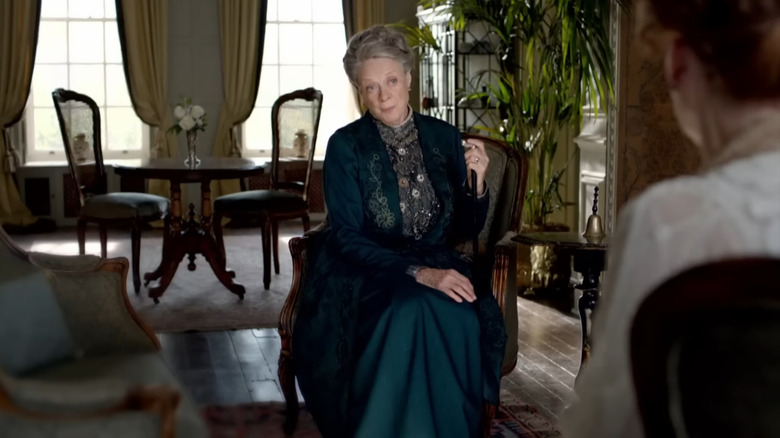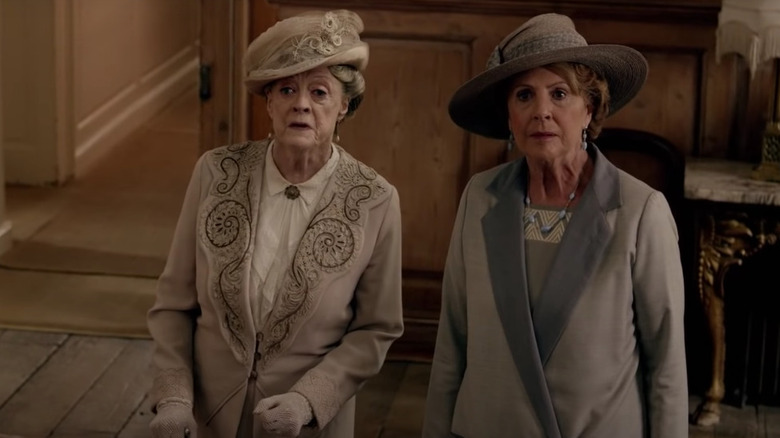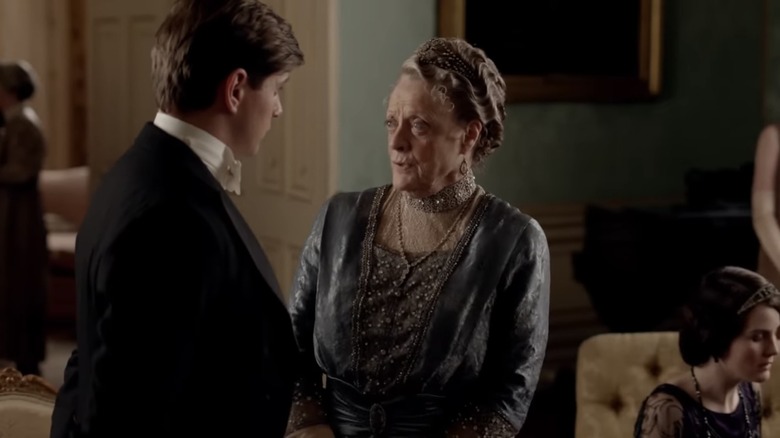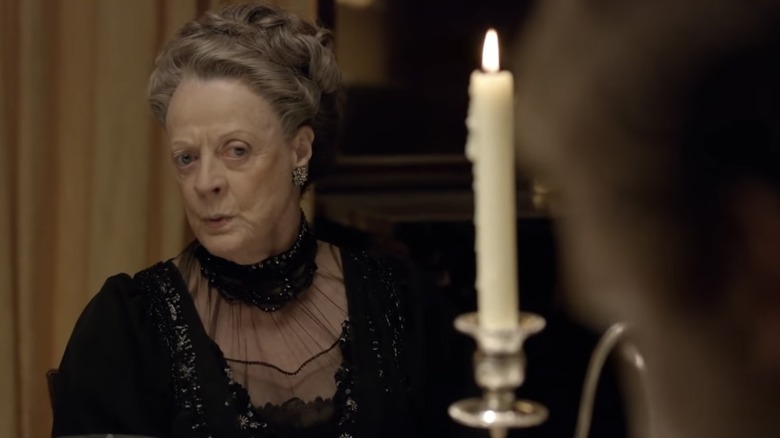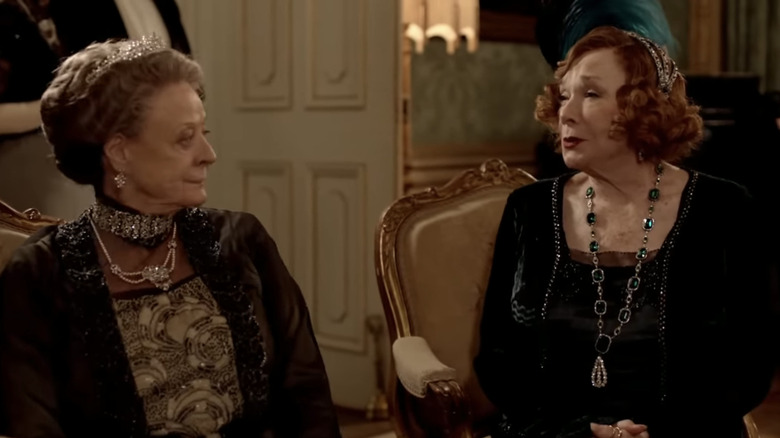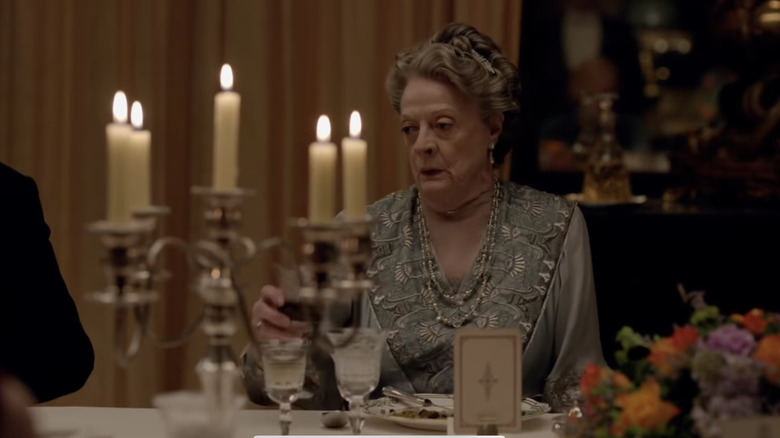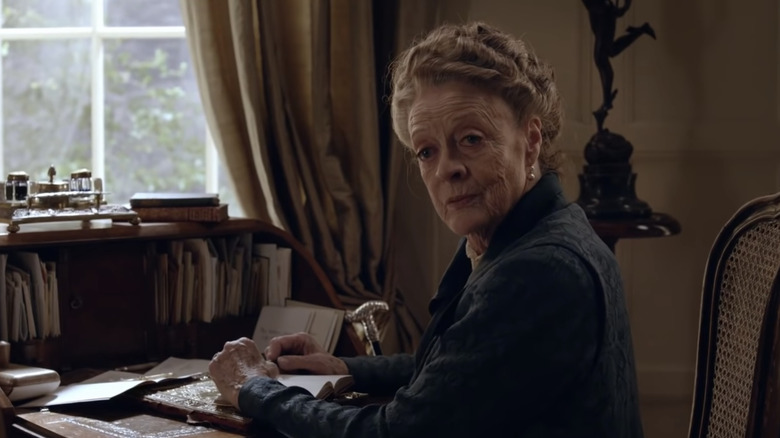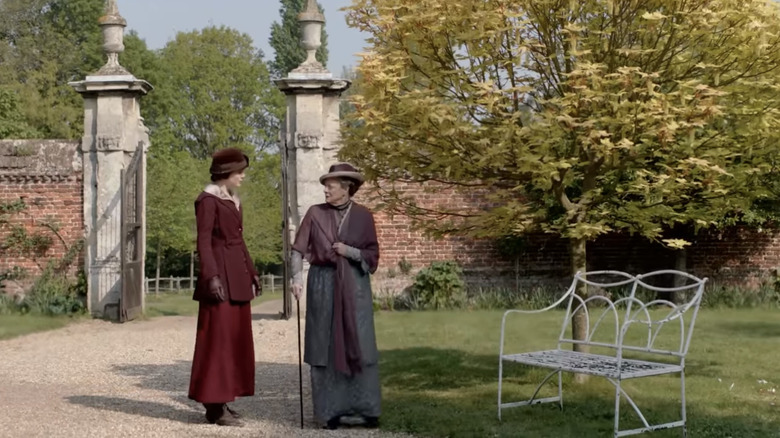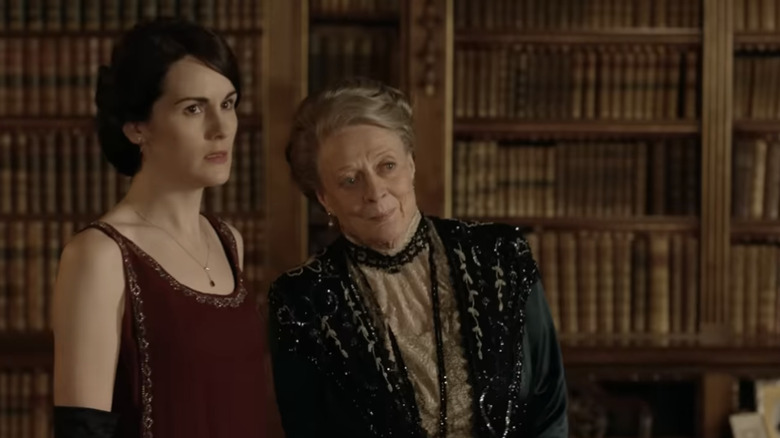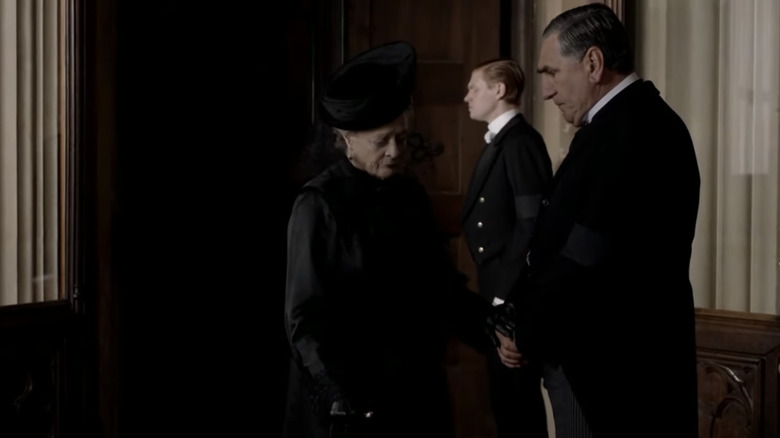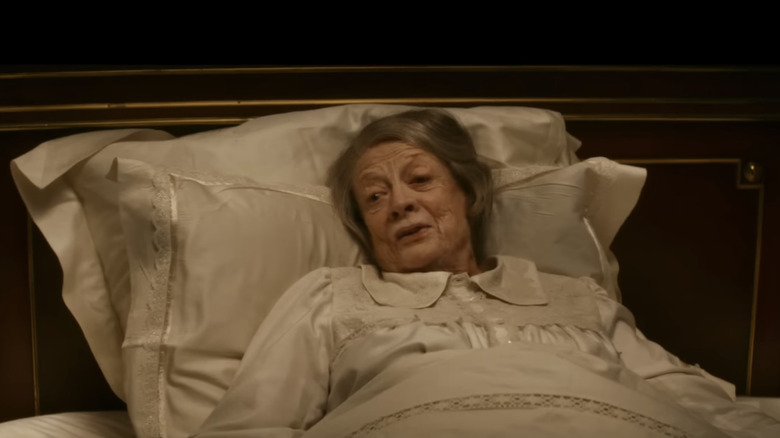Maggie Smith's Best Downton Abbey Moments Ever
With so many lovable "Downton Abbey" characters, it's tough to pick a favorite, but Dame Maggie Smith created a character that remains a step above all others. Lady Violet, the Dowager Countess of Grantham, was the matriarchal figurehead of the family. She delighted audiences by serving as the voice of reason, and often snarky disapproval, for the family.
Smith began acting on the stage in 1952. Before taking the role on "Downton Abbey," she built an illustrious career on film and stage. She has been nominated for over 100 acting awards in her long career. To honor her prolific body of work and contributions, Smith was made a Dame Commander of the Order of the British Empire (DBE) in 1990.
You would think, especially because of her role as Professor McGonagall in the "Harry Potter" series, that Smith would be used to throngs of fans flocking to her, but that simply wasn't the case. It was her role in "Downton Abbey" that brought her the most fame and recognition. "I led a perfectly normal life until 'Downton Abbey.' ... I'd go to theaters, I'd go to galleries, and things like that on my own — and now I can't!" she explained to the British Film Institute (via YouTube). That's because when Lady Violet entered a scene, fans paused with bated breath to see what she might say or do. We rounded up the best moments that Maggie Smith gave us as Lady Violet on "Downton Abbey."
The dowager made no apologies
One truth that accompanied Lady Grantham's character throughout the show is that she was never wrong. And no character was ever allowed to question that gospel — that is, until Cousin Isobel Crawley was introduced. The Lady Violet/Cousin Isobel dynamic created fireworks from the start. Lady Violet wasn't used to having another wise and outspoken older woman with which to compete, and Isobel was the perfect complement to Lady Violet's growth.
Even the cast of "Downton Abbey" enjoyed the blossoming friendship between the two characters throughout the course of the show. Laura Carmichael, who plays Lady Edith Crawley, referred to Violet and Isobel as "strange besties" in an interview with Vanity Fair (via YouTube). Although Violet was quick to take a shot at anyone who dared to engage with her, Isobel was one of the few who seemed to turn Lady Violet on her head consistently. "I think she gives as good as she gets," said Michelle Dockery, who played Lady Mary Crawley.
In Season 4, Isobel attempted to coax a necessary apology from Lady Violet, to which Violet quipped "Certainly not." Isobel could hardly stand that she wasn't able to encourage remorse from the dowager and could not resist taking a jab at her. "How you hate to be wrong!" Isobel exclaimed in frustration. Lady Violet coolly replied, "I wouldn't know. I'm not familiar with the sensation" (via YouTube). If a singular moment could define the dowager countess, it was this conversation!
Lady Violet couldn't resist bemoaning her own kind
Lady Grantham's position introduced a new title that many of us were not familiar with before "Downton Abbey" — the dowager countess. Merriam-Webster defines a countess as a woman who holds the same rank of count or earl on her own or through her husband. She is referred to as a dowager upon her husband's passing, and the root of the word is based on dowry, or to endow.
It was easy to see that Violet loved being part of the English aristocracy and took to her duties with great ease. She was always quick to put family members in their place if anyone stepped out of line with less-than-virtuous behavior. She took the responsibilities of a noble matriarch quite seriously. However, she did not hold back on her opinion when she found the obligations of the aristocracy to be cumbersome or annoying.
When the family valet's son, Tom Branson, became part of the family, Violet took it upon herself to coach Tom on how to address a person by title in various situations. The rules proved to be confusing and frustrating for Tom, and he exclaimed, "There's no logic in it!" With the customary quick wit that was to be expected of Lady Grantham, she retorted, "Oh no! But if I were to search for logic, I should not look for it among the English upper class" (via YouTube).
The countess remained out of touch with commoners
Despite the lack of special effects, monsters, or explosive action scenes, the show creator Julian Fellowes revealed in his book, "The World of Downton Abbey," that each episode cost $1 million to make. The show displayed the opulence, style, and mannerisms of nobility in the Edwardian era. A historical adviser was used to "ensure they mind their Edwardian manners perfectly, from ramrod-straight posture to perfectly starched collars," according to the Driehaus Museum.
Nobility has always been set apart from commoners and followed a stricter set of rules that dictate their daily life, with no distinction of days like Manic Monday, TGIF, or the Sunday Scaries. Lady Violet reminded us all that she and her aristocratic peers followed the same set of circumstances on a near-daily basis when she delivered what may be one of the best lines of the entire show.
In Season 1, while the family was discussing plans for Matthew Crawley to help run the estate, he assured everyone he would work around his new job and help with the estate on his weekends. A confused Violet asked earnestly, "What is a weekend?" (via YouTube). It's a fan-favorite line, and Entertainment Weekly called it the most quoted line of the show. The dowager's befuddled reaction defined the separation between the Crawley family and those who came into their lives from common beginnings, like Matthew and Tom Branson.
Lady Violet took a shot at American culture
The relationship between Cora Crawley's American mother, Martha Levinson, and the dowager countess was another source of snarky quips and fireworks on "Downton Abbey." The two traded jabs and side-eyes every time they were in a scene together. The brilliant casting of American legend Shirley Maclaine pushed the sarcastic barbs between the characters to their highest potential. "[Violet] thinks everything was better in the past and now it's falling to bits. Whereas Martha is the opposite: She thinks changing is great and the future is terrific and she wants to fly on a jet plane and get moving," a show writer told The Guardian. "So you have these two almost exact contemporaries in real life facing back towards the 19th century and forward to the 21st."
Americans on "Downton Abbey" were often portrayed as indifferent to the monarchy and aristocracy — which Britons believe is a divine right that has guided their social structure for centuries. Naturally, Lady Violet conveyed the attitude of disgust with American vulgarity and apathy toward British pomp.
The dowager could not resist taking a swipe at Martha and America when she was informed of Martha's impending visit in Season 3. Violet sarcastically told Cora, "I'm so looking forward to seeing your mother again. When I'm with her I'm reminded of the virtues of the English." Matthew clarified, "But isn't she American?" Without missing a step, the countess quipped, "Exactly" (via YouTube).
Lady Violet gets her feathers ruffled
Nothing got Lady Violet worked up quite as much as being bested, and there were only a handful of instances in the show when anyone else managed to get the upper hand. She enjoyed picking on the unworthy men that her granddaughters brought home, and she never let her son have the final say, despite being lord of his own estate. Lady Violet mostly lived in denial about her need to argue with anyone at all: "I never argue, I explain!"
When someone took a swipe at her, she typically let the comment roll off her back. At her most irritated, Lady Violet held her tongue. She is, after all, a countess. But Cousin Isobel knew how to stand her ground with her contemporary, and she was able to fluster the great matriarch on occasion.
In Season 6, the dowager's frustration took her as close to losing her cool as she had ever been. In the middle of an argument with Isobel at dinner, Lady Edith dared to stick up for Isobel's right to debate the dowager, pleading, "I suppose Cousin Isobel is entitled to put up an argument." It's at this moment that we saw Lady Violet's true opinion of herself and her rank. "Of course she is! She's just not entitled to win it!" the dowager insisted (via YouTube). She was so upset by the interaction that she continued to cluck into her dessert to soothe her nerves.
When Lady Violet gave a rare show of emotions
Despite the friendship between Isobel and Violet being the source of some of the testiest dialogue, such as, "Put that in your pipe and smoke it," they did warm to each other over time. They even depended on each other for advice, caregiving, and camaraderie by the end. Isobel became one of Violet's closest friends, so when Isobel announced her marriage to Lorn Merton, it brought about mixed feelings for the dowager.
Lady Mary attempted to address the topic of Isobel's wedding with her grandmother, assuming Lady Violet was envious that Isobel was getting married, and her rank would change. Violet was quick to correct her granddaughter. "That is not the reason. If you must know, I've gotten used to having a companion. A friend, you know? Someone to talk things over with." She continued, "Isobel and I had a lot in common, and I shall miss that" (via YouTube).
Fans adored this tender moment that Smith gave us. One YouTube commenter explained, "Her best moment was when she thought Isobel would leave to get married, and she told Mary she had become used to having a companion. One of the more emotional dowager moments."
The dowager defined womanhood
Lady Violet was such a scene-stealing sensation that countless articles and videos have popped up to pay tribute to some of her best lines. You can find leadership tips, advice on being happy, and how to be a proper woman all through the lens of the Dowager Countess of Grantham.
She counseled her granddaughters often, especially when it was time for one of them to choose a suitable husband. She dispensed advice and feedback on what it meant to be a woman and a wife and played an integral part in every major life decision Lady Mary, Lady Sybil, and Lady Edith ever made.
Lady Violet sometimes contradicted herself, depending on the mood. She advised her granddaughters to be obedient and defer to their husbands, and not work outside the home. On other days she relished in the secrets that women kept from men and encouraged her granddaughters to have a bit of fun playing the field before settling down. In Season 2, when Lady Mary tried to call out Violet's contradictions to her, the matriarch gave a gender-defining retort for the ages: "I'm a woman, Mary. I can be as contrary as I choose" (via YouTube).
Lady Violet did not hide her feelings for Sir Richard
The dowager was fiercely defensive of her family and loyal until the end. When anyone dared to cross the Crawley family, Violet made sure the perpetrator was aware of her sharp disapproval. When Lady Mary became involved with Sir Richard Carlisle, their eventual demise set up one of Lady Violet's snarkiest and most satisfying comebacks.
Lady Mary's entanglement with Sir Richard was fraught with skeletons and obligations. Fans were cool toward his character because everyone wanted Lady Mary to find true love, and it was easy to see that the relationship with Sir Richard was on a rocky path. Iain Glen, who played Sir Richard, told The Daily Mail that he appreciated playing a villain type. "Being a baddie gives you a little bit more room to play with. But I wanted him to be a genuine threat to Mary's feelings for Matthew. The audience had to believe that the relationship could have had legs."
Thank goodness the legs fell off. After Lady Mary broke it off with Sir Richard, he came to the family to say his goodbyes. "I'm leaving in the morning, Lady Grantham. I doubt we'll meet again," he announced. Smith delivered the dowager's line with the sarcastic kill-him-with-kindness tone and a smug smile that fans adored: "Do you promise?" (via YouTube). The show's fans appreciated this moment as one of the most savage one-liners the dowager ever delivered.
Lady Violet helped Cora and Robert grieve Sybil's death
Sometimes the characters of "Downton Abbey" endured tragedies that were so devastating, the only thing to cling to was the wise advice from the elder of the family. It was in those tender moments that Smith created lasting impact through her role as one of the family leaders.
In Season 3, the untimely and shocking death of Sybil left the entire family inconsolable and bordering on implosion. Smith fully embodied the grief of a grandmother throughout the episode, sharing tender moments with family and staff alike. Lady Violet could see the pain of Sybil's passing wearing on her son, Robert, and Lady Cora. There was confusion surrounding Sybil's care during her labor and delivery and the unanswered questions left the grieving parents blaming each other.
The dowager offered her son wise words of healing in a heavy-hearted moment that defined her. "My dear, when tragedies strike, we try to find someone to blame. And in the absence of a suitable candidate, we usually blame ourselves. You are not to blame. No one is to blame. Our darling Sybil has died during childbirth, like too many women before her, and all we can do now is cherish her memory and her child" (via YouTube).
The dowager countess' graceful final exit
In the second movie, "Downton Abbey: A New Era," Lady Violet prepared for her final exit. The writers had originally hinted at her final chapter in the first movie, but the show's creator Julian Fellowes wanted to give her a full send-off in a movie, rather than simply write her off the cast. "I felt she'd been so iconic a character since the show began and so part of its great success that I felt we all wanted to make much more of it. So, we decided it was time. It's quite moving, really," he explained to the Los Angeles Times.
Since the character was the beloved matriarch of the family, her death was appropriately gentle and momentous. She was warm in her bed, surrounded by family, and was able to say a few last apologies and explanations to wipe her slate fully clean before she departed.
But it wouldn't be Lady Violet without at least one more zinger. Her maid, Denker, walked in to say goodbye while in a fit of blubbering, and the dowager couldn't allow someone else to steal her spotlight for her final diva moment. "Stop that noise. I can't hear myself die," she teased (via YouTube). She died the very next moment. Director Simon Curtis told the Los Angeles Times, "It's nice to just have one laugh tucked into the middle of it. I thought that was good for her to go out undefeated."
